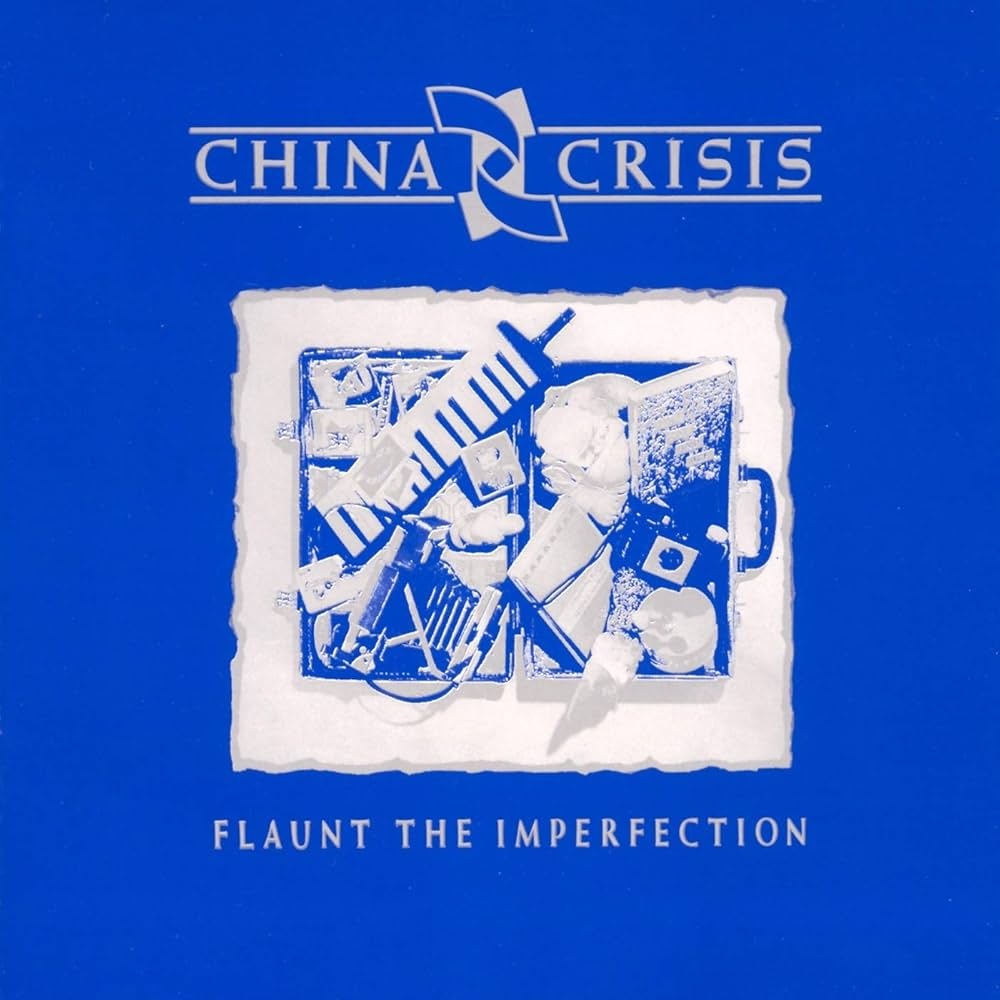Eddie Lundon and Gary ‘Gazza’ Johnson remember making the band’s celebrated third album

Released in 1985, China Crisis’ Flaunt The Imperfection saw the Scouse outfit team up with Steely Dan’s Walter Becker for an LP that remains a favourite with both fans and the band alike, as Eddie Lundon explains…
Sometimes, a band will arrive fully formed and that doozy of a debut is the album they will never top. Just as often, it’s that second record that’s embraced as their chef-d’œuvre. Less common is the third LP being the group’s most successful and beloved. But for Eddie Lundon of China Crisis, 1985’s Flaunt The Imperfection was when all the stars aligned and the album remains, 40 years on, his pick of the band’s seven long-players.
“It was my favourite album to record out of all of them,” he beams over Zoom from his home in Liverpool. “It had some great songs on it – I mean, you knew when you were in the studio, they just felt good and, dare I say it, commercial.”
There are a myriad reasons why Lundon might rhapsodise so giddily over China Crisis’ third record, which celebrates its Ruby anniversary this year. Firstly, it’s still the group’s most commercially successful album, hitting a high of No.9 in the UK (Difficult Shapes & Passive Rhythms, Some People Think It’s Fun to Entertain and Working With Fire And Steel: Possible Pop Songs Volume Two peaked at No.21 and No.20 respectively) and gifted the band – then made up of Lundon and Gary Daly, plus bassist Gazza Johnson and drummer Kevin Wilkinson – two Top 20 hits in Black Man Ray and King In A Catholic Style. But more than even that, the sessions for Flaunt The Imperfection hold precious, never-to-be-topped memories for Lundon as it was his first time working with his hero, Walter Becker of 70s yacht rock deities Steely Dan.
“To this day, they’re still my favourite band of all time… bigger even than The Beatles! And that’s a big thing to say coming from Liverpool,” he laughs.
Thinking Big
China Crisis had been in the US touring their Working With Fire And Steel… album alongside Simple Minds when their label’s head of A&R sat them down and asked who they fancied masterminding their next LP. “I jokingly said Gary Katz, because he’d done all the Steely Dan albums,” recalls Eddie, “and then they turned around and said, ‘Well, we think we can do better than that, we’ve got Donald Fagen and Walter Becker on our books…’”
Steely Dan were, in 1984, in the midst of a 12-year hiatus with Becker moving increasingly into production work. Unbeknownst to Eddie, his long-time hero had already come across China Crisis.
“Walter was a huge music fan,” Eddie says of Becker who died in 2017. “He would just go into shops and buy albums, often based only on the sleeve. So we contacted him and he said, ‘I’ve got Working With Fire And Steel!” He was being offered all these production jobs and saying no to all of them, but he said, ‘I’m really interested in this.’”
In fact, Becker was so into the idea of working with China Crisis, that he was happy to up sticks from Hawaii to the less sunlit environs of East Sussex.
But as Lundon recalls, the songs themselves weren’t even finished at the time that Becker arrived in England. “They were just instrumentals,” he says, wincing at the thought of playing these half-cooked, scrappy demos to this giant of pop-rock. “We’d be saying, ‘It goes like this…’ [sings nonsense words]. I mean, he must have thought we were insane! This is one of the best musicians in the world, from one of the best bands in the world and he must have been thinking, ‘What the hell am I about to take up?’”
Eddie laughs at the memory, but as it turned out, his and Daly’s dynamic reminded Becker of his working relationship with former bandmate Donald Fagen.
However, as critically worshipped as Steely Dan were in the 70s, by 1985 they were seen as yesterday’s men, and Eddie says that the bigwigs at Virgin were unsure about having “this washed-up 70s popstar” helming the third China Crisis album – their first records were produced by “flavour of the month” types, as Eddie refers to them. Not just that, but even Gary Daly was unconvinced by their choice of producer. Says Eddie: “He’d have been happy with Brian Eno doing every album.”
Polished China
Though Lundon is keen to talk up the contribution of sound engineer Phill Brown, who’d worked with The Rolling Stones, Led Zeppelin and Jimi Hendrix among many others, Flaunt The Imperfection is unmistakably a Walter Becker production. With its silky, jazz flourishes and rolling bass style, it could almost be a Steely Dan album, so polished and production-honed is its sound. When asked about what made the album work, though, Eddie points to the fact that it doesn’t sound typical of 1985. “It was basically like a combination of the 60s, 70s and 80s,” he suggests. “We were the 80s band, Walter was the 70s rock star and Phill had come up through the 60s. So it was just one of these perfect storms where everything just worked.
“Also, technology was just changing at that point,” he says. “The first two albums were made on two-inch tape, but for Flaunt The Imperfection, a lot of digital technology was coming in, which gave you more scope.”
As chuffed as Lundon was to be working with Walter Becker, the former Steely Dan man was a sometimes exacting presence in the studio, as Eddie recalls. “It had to be right,” Eddie explains about the famously perfectionist producer. “We’d sometimes do stuff to exhaustion, playing it again and again and again. One of the differences is that [with the first two albums] we’d come in and start recording and layer stuff within the studio, but there was more pre-production with Flaunt The Imperfection. We’d sit in the room, even for like a week or two before we even pressed ‘record’ and we’d rehearse, and Walter would be walking around making sure everything’s just right.”
One of Lundon’s most vivid memories of the recording of Flaunt… is of Becker holding a stopwatch in the studio, like some 1950s sports coach. “Even though all this digital technology was available, telling you time in milliseconds, it was like he didn’t believe in them,” he says fondly. “Walter would sit there with this old-fashioned stopwatch and say, ‘We’ve got to record in five, four, three, two, one…’ I think it’s because he wanted the music to sway. It wasn’t about putting things into a computer, it was more about, ‘we’ve got to feel this’.”

No Frills
Former bass player, Gary ‘Gazza’ Johnson, adds: “Walter was amazing, it was like a masterclass in arranging, he stripped everything back to the component parts and took out anything that he thought was frills. There’s a reason you can hear every note on every instrument in his work. The opposite to the 80s kitchen sink sound.
“Kevin [Wilkinson, drummer] had left after the recording of Fire & Steel to play with his mate, Jonathan Perkins. After an intensive touring schedule, we had a break then started thinking about songs for a third album. Gary was writing on his own in his parents’ living room and I was working with Ed in his bedroom just demoing with a Roland drum machine and a four-track cassette deck.
“It was the summer of 1984 and we were just having fun, playing tunes and going to the pub. We had a meeting, the three of us, in Gary’s back garden on a sunny Monday afternoon. All we had were backing tracks and as soon as Gary hit ‘play’ and Black Man Ray came on I knew we were back in business. Ed played our tracks which were funkier and slick. Then we got in touch with Virgin and they said Walter Becker was interested in working with us, so a meeting was arranged at Barwell Court in Chessington. Kev was out of work so we offered him his job back. Walter was the cherry on the cake.
“Working with Walter helped us to make the transition from synth-pop to adult contemporary rock, so it opened up a whole new audience for us. One with disposable income and nice cars.”
All The Thrills
For all the thrills of working with his hero, and the finished product, it must have been a hard, if productive slog, surely?
“It took three-and-a-half months, and you couldn’t get away with that now,” Eddie says. “But we were kids having the time of our lives and making our third album with one of the greatest rock stars in the world. We were just in the moment I suppose.
“But while I was a bit starstruck, Gary used to say, ‘Who is this little old man in the room?’ I mean, Walter was only about 12 years older than us, but when you’re in your twenties, even people who are in their thirties look old!”
Of course, one of the critical differences between China Crisis’ previous producers, which included Mike Howlett and Steve Levine, was that Walter Becker was also a songwriter. Lundon remembers him and Daly presenting You Did Cut Me to their producer and being told, “This song doesn’t have a chorus.”
“It was the first time that had ever been said to us,” Eddie says. “And we thought, ‘Oh, shit.’ So he said that me and Gary should go to a hotel room and finish it. I mean, this was the first time we’d worked with someone who was actually contributing to the creative side.” (Becker was seen as so crucial not just to the sound, but the songs on China Crisis’ third album that he was listed as an official band member on the sleeve.)
Style & Content
When Flaunt The Imperfection took its bow on 29 April 1985, critics gushed (“Easily their most consistent and stylish set yet” cooed Smash Hits), while chart successes were spawned in the lilting Black Man Ray and the synth-fuelled King In A Catholic Style.
“We thought they were more like the earlier more electronic stuff we did, and the rest of the album was more West Coast American yacht rock,” recalls Eddie.
“We said to Virgin we didn’t want those songs on the album because they were too poppy, but they said, not only are they going to be on the album, they’re going to be singles.” He laughs. “We were never
great at picking hit singles!”
China Crisis would end up working with Becker on 1989’s Diary Of A Hollow Horse, but Flaunt… remains Eddie’s go-to (“To me, it’s the most complete album,” he says proudly). And this year he and Gary are touring the record, playing the LP in full, plus all of those China Crisis evergreens, such as Wishful Thinking, African And White and Christian.
If you’ve ever seen a China Crisis concert, you’ll know to expect more chat than your standard pop gig. Fans get to hear many of the stories behind the songs and witness some of the warm banter between Eddie and Gary.
“Honest to God, sometimes he’s like Ken Dodd,” Eddie laughs of his garrulous bandmate, a man he’s known and worked with since his teens. “He can talk for fucking hours! But our gigs, I mean they’re funny, they’re humorous and it’s great music.”
Daly told Classic Pop last year that he considered Flaunt The Imperfection to be the final part of a trilogy and that all the band’s LPs after that were mere “homages”. Forty years on, it remains their masterwork and a record that’s stood the test of time. Despite its self-deprecating title, it’s hard to find a more perfect album.
As Johnson surmises: “The band can do sell-out theatre tours primarily made up of the songs from Flaunt. The songs are still a joy to play and it’s the audience who determine whether they are still relevant after 40 years.”
For more on China Crisis click here
Read More: Top 15 Sophisti-Pop Albums
Classic Pop may earn commission from the links on this page, but we only feature products we think you will enjoy.


